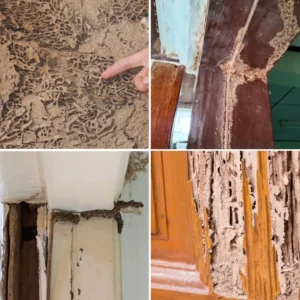I. Understanding Termite Behavior
A. Introduction to Termites
Termites, being highly social insects, can cause significant damage to homes if left unchecked. Therefore, understanding their behavior is crucial in preventing infestations.
1. Different Types of Termites
- Subterranean: These termites live underground, constructing mud tunnels to access their food source.
- Drywood: These termites, on the other hand, nest inside the wood they infest and don’t rely on soil contact.
- Dampwood: These termites thrive in humid environments, showing a preference for wood with high moisture content.
2. Termite Colonies and Social Structure
Termites live in large colonies with a complex social structure, comprising workers, soldiers, and reproductives. The queen is responsible for laying eggs, while workers forage for food and build tunnels.
Common signs of termite infestation include mud tubes on walls, discarded wings near windows, and hollow-sounding wood. Therefore, regular inspections are key to detecting termites early.

A. Structural Modifications for Termite Prevention
Taking preventive measures to deter termites from infesting your home is essential.
- Moisture Control : Termites are attracted to moisture, therefore ensuring proper ventilation and repairing leaks can help prevent infestations.
- Removing Wood-to-Ground Contact : Eliminating direct contact between soil and wood structures can reduce the risk of termite entry. Consequently, this action helps in preventing potential termite infestations.
- Sealing Cracks and Opening: Sealing cracks in the foundation and walls can prevent termites from gaining access to the interior of your home. Additionally, this measure helps to fortify your home against potential termite invasions.
B. Landscaping Tips to Deter Termites
Landscaping plays a role in termite prevention by creating barriers to entry for these pests.
- Proper Drainage :Maintaining proper drainage around your home can prevent water accumulation, which attracts termites.
- Mulching Techniques: Additionally, use non-organic mulch around your home to reduce the risk of attracting termites.
- Tree and Shrub Maintenance: Moreover, regularly trim trees and shrubs to prevent them from becoming a bridge for termites to reach your home.
III. Termite Treatment Options
A. Chemical Treatments for Termite Control
Various chemical treatments can be effective in eliminating termites from your home.
- Liquid Termiticides : Applied to the soil around the foundation, liquid termiticides create a barrier that kills termites on contact.
- Termite Baits: Furthermore, baits are placed strategically around your property to attract and eliminate termite colonies.
- Fumigation: Additionally, fumigation involves enclosing your home in a tent and releasing gas to kill termites inside.
B. Non-Chemical Methods of Termite Treatment
For those seeking alternative methods, non-chemical treatments are available.
- Heat Treatment: Heating the infested area to a temperature that kills termites is an effective non-chemical treatment.
- Electromagnetic Pest Control: Moreover, devices emitting electromagnetic waves can deter termites from infesting your home.
- Biological Control Methods : Additionally, using beneficial nematodes or fungi to target termites can be a natural and eco-friendly form of pest control.
IV. Hiring a Professional Termite Treatment Service
A. Choosing The Right Termite Treatment Company
When dealing with a termite infestation, it’s crucial to hire a reputable pest control company.
- Licensing and Certification: Ensure the company is licensed and certified to handle termite treatments in your area.
- Treatment Guarantee: In addition, choose a company that offers a treatment guarantee to provide peace of mind.
- Customer Reviews and Recommendations: Furthermore, seek out reviews and recommendations from past customers to gauge the company’s reputation.
V. Conclusion and FAQs
A. Summary of Key Points
Understanding termite behavior, as well as prevention methods, treatment options, and the importance of hiring a professional pest control service, are key to keeping your home termite-free. Additionally, familiarizing yourself with the signs of termite infestation can help you detect and address any issues promptly. By taking proactive measures and seeking expert assistance when needed, you can effectively safeguard your home against termite damage.
B. Frequently Asked Questions
- How long does termite treatment last?
- The effectiveness of termite treatments can vary, but annual inspections are recommended for long-term protection.
- What are the costs associated with termite treatments?
- Costs can depend on the extent of the infestation and the treatment method used, starts from Rs.999
- Are DIY termite treatments effective?
- DIY treatments may provide short-term relief, but professional services are typically more effective in eradicating termite infestations.
Remember, early detection and proactive prevention are key to keeping your home termite-free. Stay vigilant and address any signs of termite activity promptly to protect your home from costly damage.
